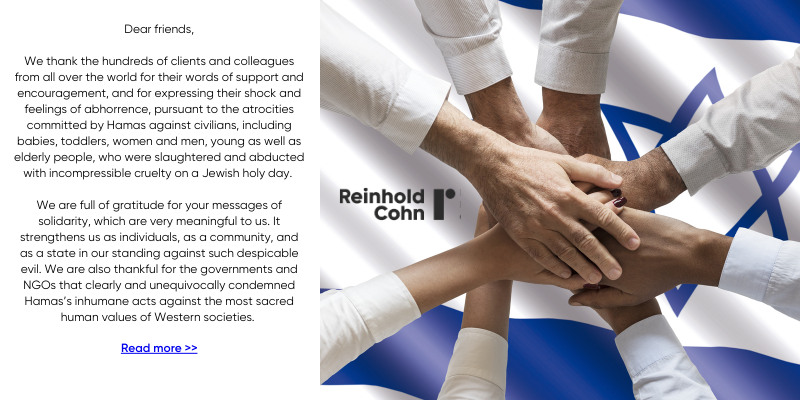Patent Term Extension – Developments in Israel in 2012

Clarifying the interpretation of what constitutes a first pharmaceutical registration for medical purposes as the basis for patent term extension, the Jerusalem District Court ruled that a prior registration of an active ingredient in a veterinary preparation does not preclude the grant of a patent term extension to a medical preparation containing the same active ingredient for treatment in humans. In another case, the Registrar of Patents, taking a formal approach to patent term extensions, refused an application for patent term extension where the term of the corresponding US reference patent had not been extended but continued in force until 2024 as a result of US patent reform of 1994.
(I) Background – Patent term extension under current Israeli law
Under the Israeli Patents Law, 5727 – 1967 (the “Patents Law” or the “Law“), patent term extensions of up to five years may be requested1 for patents claiming inventions in the field of pharmaceuticals and regulated medical devices, to compensate the patent holder for regulatory delays.
Conditions for grant
Section 64D lays down the conditions for obtaining an “extension order” (as patent term extension is referred to in the Patents Law; both terms will be used interchangeably in this newsletter). A patent term extension (PTE) may be obtained for a patent that is in force and that concerns a pharmaceutical product2 or a regulated medical device. In the case of a pharmaceutical product, the event that triggers the right to apply for a PTE is the registration of the pharmaceutical product in the Israeli Register of Pharmaceuticals (the “Register of Pharmaceuticals“) maintained by the Israeli Ministry of Health (“MOH“) under section 47A of the Pharmacists Ordinance [New Version], 1986.
A PTE may be granted only on the first registration of a pharmaceutical product containing the active ingredient in the register of pharmaceuticals, and apparently only a single PTE may be obtained for each patent. It is a unique feature of the Israeli Patents Law that the grant of the PTE is dependent on PTE granted elsewhere; more specifically, it is a condition of grant of a PTE in Israel that a “reference patent” (a counterpart patent of the patent for which the PTE was requested) has been extended in the US (if the pharmaceutical product has been approved for marketing in the US) and in at least one other European recognized country (if the pharmaceutical product has been approved for marketing in such country).3
Deadline for filing
The deadline for filing an application for an extension order is within 90 days from the date of the registration of the medical preparation under the Pharmacists Ordinance4 but may, under the current law, be extended in limited circumstances.5
Calculation of extension term
An extension order is granted for no more than 5 years, and the cumulative term of protection, both under the basic patent and the extension, must not exceed 14 years from the first marketing authorization in any of the recognized countries. Furthermore, an extension order will be equal to the shortest among the extension orders for the reference patents and shall thus expire upon the expiry of the first-to-expire extension order of a reference patent.6
(II) The Neurim case – Pharmaceutical registration of a veterinary drug does not preclude a patent term extension for a subsequent human drug containing the same active ingredient
An Israeli pharmaceutical company, Neurim Pharmaceuticals, developed a drug marketed under the trade name Circadin®, which is a prolonged-melatonin-release preparation for the treatment of insomnia in human patients, for which a patent was granted in Israel in 1997. The drug was approved in Europe in 2007 and in Israel in 2008. Neurim requested an extension of the term of this patent under section 64C of the Patents Law. Melatonin was also an active ingredient in a previously registered veterinary preparation, which was a subcutaneous implant for improving fertility in sheep and which was marketed under the trade name Regulin®. Circadin® was also approved in Europe, and a Supplementary Protection Certificate (SPC) was finally approved following a decision by the European Court of Justice (ECJ), on appeal from a UK decision.7
The question was whether the proper interpretation of “medical purposes” underlying the first registration was to include veterinary medicine. The Registrar inferred from the definition of a “medical preparation” in section 64A, which expressly includes preparations for use in veterinary medicine, that “medical purposes” in section 64D(3) also covered veterinary medicine. In May 2012, the Registrar of Patents refused patent term extension for Neurim’s Circadin® drug, on the grounds that Circadin® was not the first registration in Israel of its active ingredient. In his decision, the Registrar cited with approval the ruling of the district court Lundbeck case8 (which dismissed the appeal from the Registrar’s refusal of an extension order for an enantiomer based on a prior registration of the racemate, reviewed in our newsletter of April 2009, a ruling that was left intact as the Supreme Court refused leave to appeal from it.9 The Lundbeck court held that the different treatment of the new drug by regulatory bodies was not a consideration for the purpose of determining whether it was the “first registration” for PTE purposes, while the criteria for determining PTE eligibility in Section 64D are formal-technical in nature and leave the Registrar with no discretion.
The Jerusalem District Court reversed10 the Registrar’s refusal in Neurim, holding that the Lundbeckobservation regarding the technical nature of PTE criteria did not resolve the proper interpretation of first registration of a substance “for medical purposes”. The court observed that the patent term extension provisions of the Patents Law were intended, inter alia, to compensate for regulatory delays, and that such intent should guide the interpretation of the “first registration” allowing use “for medical purposes”. Analyzing the language of the Law, the court held that the inclusion of veterinary preparations within the definition of a “medical preparation” was intended to broaden the protection by allowing veterinary patent holders to benefit from patent term extension; whereas the addition of the language “for medical purposes” narrowed the scope of what was considered a first registration. The court referred, with approval, also to the ECJ’s ruling in the Neurim matter that the existence of a marketing authorization for a veterinary medicine does not preclude the grant of an SPC for a medical application of the same active ingredient.
Following the district court decision, the Registrar granted an interim extension order until the end of the opposition proceeding, if filed.11 An opposition was indeed filed on November 8, 2012, three days before expiration of the 20-year patent term.
(III) The Kirin-Amgen case – A foreign reference patent that was not formally extended (but was in force due to a change in law) precludes patent term extension in Israel
A somewhat formalistic approach adopted by the Israeli Patent Office in the Kirin-Amgen application led to a refusal of patent term extension.
Kirin-Amgen applied for an extension order for a patent claiming the active ingredient of its Aranesp® drug for the treatment of anemia, darbepoetin alfa.12
As described above, the Patents Law (Section 64D(5)) provides for a “two state” requirement, whereby it is a condition for patent term extension in Israel that there was a grant of a marketing approval in the US and in one or more of the recognized countries and that the corresponding “reference patent” in these countries has been extended. The “two state” requirement arose from the interest of the Israeli generic industry that a drug would not continue to be protected by a patent in Israel while it is no longer protected in a relevant jurisdiction abroad.13
The reference patent for the purpose of the PTE provisions of the Patents Law in the Kirin-Amgen case was a US patent14 with a filing date of June 6, 1995, which, in accordance with the transitional provision of the TRIPS amendment of 35 U.S.C. 154 of 1994,15 was entitled to enjoy a patent life of 17 years from the date of grant of the US patent, that is, until 2024. In the US, Kirin-Amgen did not – and indeed could not – seek an extension of the US patent protection.
The Registrar held that the PTE application did not comply with the language of section 64D(5) of the Patents Law, which requires, as one of the preconditions of the grant of an extension order in Israel, that the term of the US reference patent has been extended.
The applicant noted that the law in Israel did not envisage a situation where the US patent term would be longer and therefore argued that there was a lacuna to be addressed, that, alternatively, the time extension beyond the 20-year term (in view of the transition provisions of the 2006 Patent Law amendment) should be viewed as an effective extension for the purpose of section 64D(5), or that in such case the provision of section 64D(5) should not apply. The applicant argued for a purposive interpretation of the statutory requirement as ensuring that an Israeli patent does not remain in force longer than a corresponding US patent.
The Registrar held that the requirement of the Patents Law was technical and left the Registrar no discretion, so that only a patent term extension – governed by a different provision of the US statute16 – made a corresponding Israeli patent eligible for an extension.
As, in addition to patent term extensions under 35 U.S.C. 156, the US law also recognizes patent term adjustments under 35 U.S.C. 154(b), which are designed to compensate applicants for USPTO delays in the course of examination, to the extent that a reference US patent is extended only as a result of such adjustment, the above interpretation may bar the ability to obtain a PTE in Israel.
(IV) Final notes
A Bill for amending the PTE provisions of the Patents Law has been submitted to the Knesset (the Israeli parliament), but because of the legislative vacation in view of the upcoming elections, the Bill will apparently be dealt with by the next elected Knesset. The Bill is one of the implementations of the Memorandum of Understandings (MOU) between the Israeli government and the US Trade Representative of February 18, 2010. If and when it becomes law, it will have a number of important effects (positive from the perspective of innovative pharmaceutical companies) on the PTE regime in Israel, including the manner of calculation of the extended term. We will report on this legislative development in the future.
1 Under sections 64A – 64Q of the Patents Law.
2 The patent to be extended may be one having claims directed to the active ingredient (“the active ingredient of a medical preparation or the salts, esters, hydrates, or crystalline forms of such ingredient” – Section 64A), the process for its manufacture or use, and/or a
pharmaceutical preparation or its manufacture.
3 Such countries include Austria, Italy, Ireland, Belgium, United Kingdom, Germany, Denmark, Holland, Greece, Luxembourg, Spain, Portugal, Finland, France, and Sweden.
4 Section 64(O)(a) of the Law.
5 Section 164(a1) of the Law.
6 Sections 64I and 64J of the Patents Law.
7 See the UK decision of the Comptroller-General of Patents dated December 15, 2009 (BL O/384/09) refusing Neurim’s application for the grant of a Supplementary Protection Certificate in respect of its European Patent (UK) No. 0 518 468 B; affirmed on appeal in Neurim Pharmaceuticals (1991) Ltd v Comptroller-General of Patents, [2010] EWHC 976 (Pat).
On appeal by leave, in Neurim Pharmaceuticals (1991) Ltd v Comptroller-General of Patents [2011] EWCA Civ 228, the UK Court of Appeal referred interpretation of the law as to ” the first authorisation to place the product on the market in the Community” to the Court of Justice of the European Union (C-130/11, Neurim Pharmaceuticals (1991) Ltd v Comptroller-General of Patents[2012]).
8 MA (Jer. Distr.) 223/09 H. Lundbeck AS v Unipharm Ltd et al [Nevo, 2009].
9 LCA 5267/09 H. Lundbeck AS v Unipharm Ltd et al [Nevo, 2010].
10 MCA (Jer. Distr.) 13281-06-12 Neurim Pharmaceuticals (1991) Ltd v Registrar of Patents [Nevo, September 27, 2012].
11 Application for Extension Order for Patent No. 103411 in the name of Neurim Pharmaceuticals Ltd. [Nevo, September 30, 2012].
12 Application for Extension Order for Patent No. 110669 in the name of Kirin-Amgen Inc. [Nevo, September 27, 2012].
13 See the Knesset protocol of October 11, 2005, cited by the Registrar at paragraph 16 of the decision.
14 US Patent 7,217,689.
15 35 U.S.C. 154(c)(1) (enacted in the Uruguay Round Agreements Act) provides:
The term of a patent that is in force on or that results from an application filed before the date that is 6 months after the date of the enactment of the Uruguay Round Agreements Act shall be the greater of the 20-year term as provided in subsection (a), or 17 years from grant, subject to any terminal disclaimers.
16 35 U.S.C. 156.
This article is provided for general information only. It is not intended as legal advice or opinion and cannot be relied upon as such. Advice on specific matters may be provided by our group’s attorneys.

